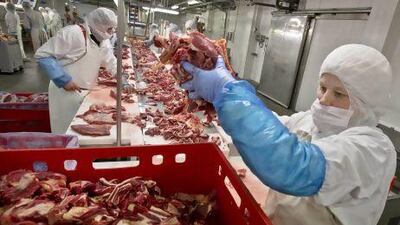LONDON // The cases so far of horsemeat found in products sold as beef are likely to be only the "tip of the iceberg", according to a British parliamentary report into the scandal that was published yesterday.
"The scale of contamination emerging in the meat-supply chain is breathtaking," said Anne McIntosh, an MP who chairs the cross-party food and rural affairs committee, which prepared the report. "More revelations will doubtless come to light in the UK and across the European Union."
Growing revelations about the use of horsemeat in products labelled as beef have raised questions about the safety of the European food-supply chain, and prompted governments to send out a EU-wide alert.
Suspect beef products have been withdrawn from sale or destroyed in Ireland, Britain, France, Germany, Switzerland, Norway, Denmark and Cyprus.
The EU's health chief said on Wednesday that all companies that had handled falsely labelled horsemeat were under suspicion, adding that the European Commission was considering strengthening EU rules on product labelling.
The British parliamentary report concluded there were strong signs that horsemeat had been intentionally substituted for beef.
"British consumers have been cynically and systematically duped in pursuit of profit by elements within the food industry," it said.
"While this is primarily a food labelling issue, the suggestion of fraud on a massive scale suggests that measures must be put in place now to prevent any further contaminated meat entering the food chain," the report added.
Alarm over beef products tainted with horsemeat grew yesterday with the revelation by British food-safety officials that six horse carcasses that tested positive for the equine drug phenylbutazone may have entered the human food chain in France.
The Food Standards Agency (FSA) said eight out of 206 horses it had checked tested positive for the equine painkiller and anti-inflammatory drug.
Of those eight, six - all slaughtered by a firm in south-west England - were sent to France and "may have entered the food chain".
However, the British government's principal medical adviser said the drug presented a very low risk to human health.
"Phenylbutazone, known as bute, is a commonly used medicine in horses [and] is also prescribed to some patients who are suffering from a severe form of arthritis," said Sally Davies, the chief medical officer.
"At the levels of bute that have been found, a person would have to eat 500 to 600 burgers a day that are 100 per cent horsemeat to get close to consuming a human's daily dose," she added.
The scandal over tainted beef erupted on January 15 when routine tests by Irish authorities discovered horsemeat in beefburgers made by companies in Ireland and Britain, and sold in supermarket chains including Tesco, Britain's biggest retailer.
Concern grew last week when the British unit of the frozen foods group Findus began recalling its beef lasagne on advice from its French meat supplier, Comigel, after tests showed concentrations of horsemeat ranging from 60 to 100 per cent.
The UK parliamentary report said Tesco and other major retailers had let consumers down by selling contaminated products, while the FSA and government had been caught flat-footed by the scandal and were unable to respond effectively.
The report said that the British government needed to find the right balance between affordable food prices and effective regulations that ensured transparency and quality.
It recommended the FSA be given statutory powers to force producers to carry out testing, and that it should undertake a broader spectrum of testing for products found to have the highest levels of contamination, to provide assurances they do not contain other non-bovine DNA or substances that were harmful to humans.
It said all the results must be reported to the FSA, whether mandated by the agency or carried out independently.
"The consumer cannot be left to face a Catch-22 where they can either pay for food that complies with the highest standards of traceability, labelling and testing, or accept that they can't trust the provenance and composition of the foods they eat," said Ms McIntosh.
* Reuters, Associated Press and Dow Jones Newswires

